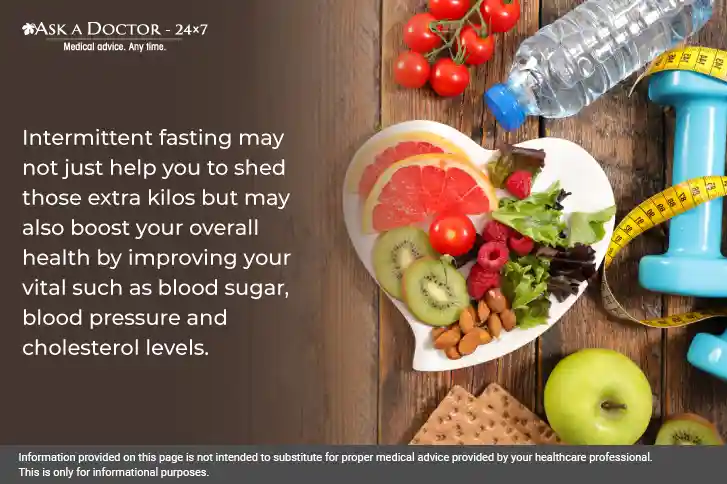Can Intermittent Fasting Help In Weight Loss? Know The Pros And Cons
Fasting is an ancient practice followed by different communities worldwide for religious and health reasons. It may involve eating only at a fixed interval (intermittent fasting), or having only specific foods or drinks, (e.g. only protein-rich foods, juices, or soups throughout the day) during a fast day...
What Does Intermittent Fasting Mean?
Intermittent fasting is an eating pattern where you alternate between not eating or eating only for a particular period. However, you need to go at least 12 hours without food to be considered a fast. Studies show that fasting for at least 16 hours is effective in bringing about a weight change.
Normally, a person eats three main meals a day along with additional snacking. A sedentary lifestyle with little or no exercise can lead to fat build-up in the body due to excess calorie intake and less activity. When one begins following intermittent fasting, the fat stored in his/her body gets utilized as energy during the fasting phase, and this in turn results in weight loss.
Intermittent fasting is not a magical remedy for losing weight. Nevertheless, the research on intermittent fasting and weight loss is promising. If you combine exercise with intermittent fasting, you will lose weight more quickly than fasting alone.
Understand the Types of Intermittent Fasting
There are different approaches to intermittent fasting. These include:
- Daily time-restricted fasting: In this type, you can eat only in a particular period. For example, you can eat anything you wish, but only within eight or ten hours each day. You may eat between 10 am and 8 pm (14 hours fasting) or 12 pm to 8 pm (16 hours fasting), depending on your overall health status.
- Alternate day fasting: In this type, one has to eat a normal diet for one day, then the next day keep a complete day fast or have one small meal (less than 500 calories).
- 5:2 fasting: You can have a normal diet five days a week and fast two days a week. For example, fast on Mondays and Thursdays, and eat on the rest of the days cutting calories by at least 75%.
Advantages of Intermittent Fasting

Although the main reason to go for intermittent fasting is to lose weight, there are other benefits also that come along with fasting (even if you do not lose weight).
Some of the advantages of fasting include:
- Weight loss
- Better glycemic control (blood sugar level)
- Lower blood cholesterol levels
- Lower blood pressure
- Less inflammation
- Fewer age-related ailments
- Improved brain health
- Healthier and longer life
Researchers also suggest that when compared to other diet forms, intermittent fasting may be more beneficial in reducing inflammation and improving inflammation-related health conditions such as Alzheimer's disease, asthma, arthritis, multiple sclerosis, and stroke.
Disadvantages of Intermittent Fasting
Fasting is not for everyone and carries risks if done for a long duration. Everyone has a different body type. While some people may tolerate fasting of 16 hours, other people may feel dizzy and weak due to low sugar levels or low blood pressure.
Fasting is not suitable for pregnant and lactating women, elderly people, children and teens, and people with low blood pressure and low blood sugar levels. Also, people with any chronic disease such as diabetes, gastroesophageal reflux (GERD), or other medical problems should always consult their doctor before going for intermittent fasting.
When you begin intermittent fasting, your body takes time to acclimatize to the new meal pattern. During this period, you may experience common side effects associated with fasting such as:
- Lethargy
- Dizziness
- Weakness
- Headaches
- Insomnia
- Irritability
- Dehydration
- Nausea
- Constipation
- Inability to bear cold temperatures
Most of the above side effects usually go away within 2 to 4 weeks.
Your body requires nutrients including energy, protein, fat, vitamins, and minerals from foods to keep it moving and stay healthy. Experts warn that if you don't get enough nutrients due to prolonged fasting, you may experience symptoms associated with specific nutrient deficiencies. Consult a doctor to know more about the possible side effects of fasting as per your health status.
Conclusion
Intermittent fasting is an effective way to lose weight. However, not everyone is a suitable candidate for it. Skipping meals is not healthy for children, teens the elderly, and people with chronic diseases. Physical activity when combined with intermittent fasting can show speedier results in losing weight. However, you should listen to your body and be mindful of its capacity.
Another important consideration is meeting the daily nutritional requirements. When the eating window is reduced, it may be challenging to get all the necessary vitamins and minerals. Therefore, eating a wholesome diet including fresh fruits, vegetables, whole grains, protein, and essential fats is very important to sail through the fasting period.
To achieve weight loss with intermittent fasting, you must be mindful and eat only within your eating windows. At the same time, it is critical not to overdo or prolong the fasting period as it may lead to malnutrition. You can also face other serious side effects such as a decline in blood sugar levels and dizziness. Therefore, it is always advised to consult a certified dietitian and get a personalized plan to begin fasting.
If you have any query related to weight management and diet, then you can Ask a Nutritionist online - any time and from anywhere at Ask a Doctor 24x7.
Recently Answered Questions Related to Intermittent Fasting and Weight Loss
- How To Plan Intermittent Fasting?
- What Causes Acidity While Fasting?
- Can I Try Intermittent Fasting For Overweight And Need To Lose Weight?
- Why Is My Blood Sugar Rising While Fasting?
- Can Fasting Cause Nausea And Vomiting?
- Is Intermittent Fasting Safe And Effective For Weight Loss?
- What Causes Constipation And Abdominal Bloating After Fasting?
- Want Lean, Ripped Body. Done Intermittent Fasting. Can I Burn Body Fat This Way?
- What Causes Hair Loss Along With Palpitations While On Intermittent Fasting?
Disclaimer: Information provided on this page is not intended to substitute for proper medical advice provided by your healthcare professional. This is only for informational purposes.
Ask a Specialist
Recent Questions


